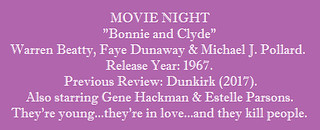

Review #981: Bonnie and Clyde.
Cast:
Warren Beatty (Clyde Barrow), Faye Dunaway (Bonnie Parker), Michael J. Pollard (C.W. Moss), Gene Hackman (Buck Barrow), Estelle Parsons (Blanche Barrow), Denver Pyle (Frank Hamer), Dub Taylor (Ivan Moss), Gene Wilder (Eugene Grizzard), and Evans Evans (Velma Davis) Directed by Arthur Penn.
Review:
August holds significance for this film, as it was released 50 years ago on this month, with three different premieres: August 4 (for the Montréal Film Festival), August 13 (New York), and August 23 (Los Angeles) before going into general release the following month. In any case, I decided it made sense to finally cover this movie today to see how it has aged after (roughly) 50 years. There is something about how the movie works on nearly every level, from its cinematography by Burnett Guffey to its dynamic cast to how it becomes more than just a movie with violence (and lots of it) that opened the floodgates to a new level of bloodshed in cinema that is still readily apparent today. There have been countless other films revolving around criminals and/or a good deal of violence (such as say, The Wild Bunch (#591), though that was a Western), but this does not manage to fall into the background because of how it operates itself, with the ending scene being shocking in its execution. Of note is the use of squibs (a miniature explosive device) in order to imitate bullet hits, which surely stands out from prior movies that didn't have as much (or any) blood for the violence. The editing by Dede Allen is also quite good, having a rapid pace that rolls with the action neatly, with influence coming from the styles used for films directed during the French New Wave. Beatty and Dunaway both do great jobs, along with having a great chemistry together that seems instantaneous. The rest of the cast is also quite excellent in roles that led to further fame (along with an Academy Award for Best Supporting Actress for Parsons), with Hackman and Parsons being enjoyable to watch in their interactions within the Barrow Gang. In a film as rough as this is, there is still a level of humor and excitement one can get from all that happens in the movie, from the first scene with Beatty and Dunaway to the Gang escaping from the cops with Parsons holding onto a spatula. It's a forthright kind of film that never seems inauthentic with its goals and pace. The film does take liberties with what happened in real life with the Barrow gang, but it does not alter the fact that this is still a fine piece of entertainment that never ceases to be anything other than captivating.
This was a controversial film upon release, with criticism being about the level of violence apparent in the movie, but it was still a major success (no doubt due its appeal for the generation the movie was released to). No matter what you might think about how the film portrays violence, the legacy that Bonnie and Clyde has in changing the way violence is depicted on screen is undeniably still felt today, for better or for worse. It may not be everybody's cup of tea, but it definitely pulls no punches in how it operates itself and achieves all of its goals.
Overall, I give it 9 out of 10 stars.

No comments:
Post a Comment